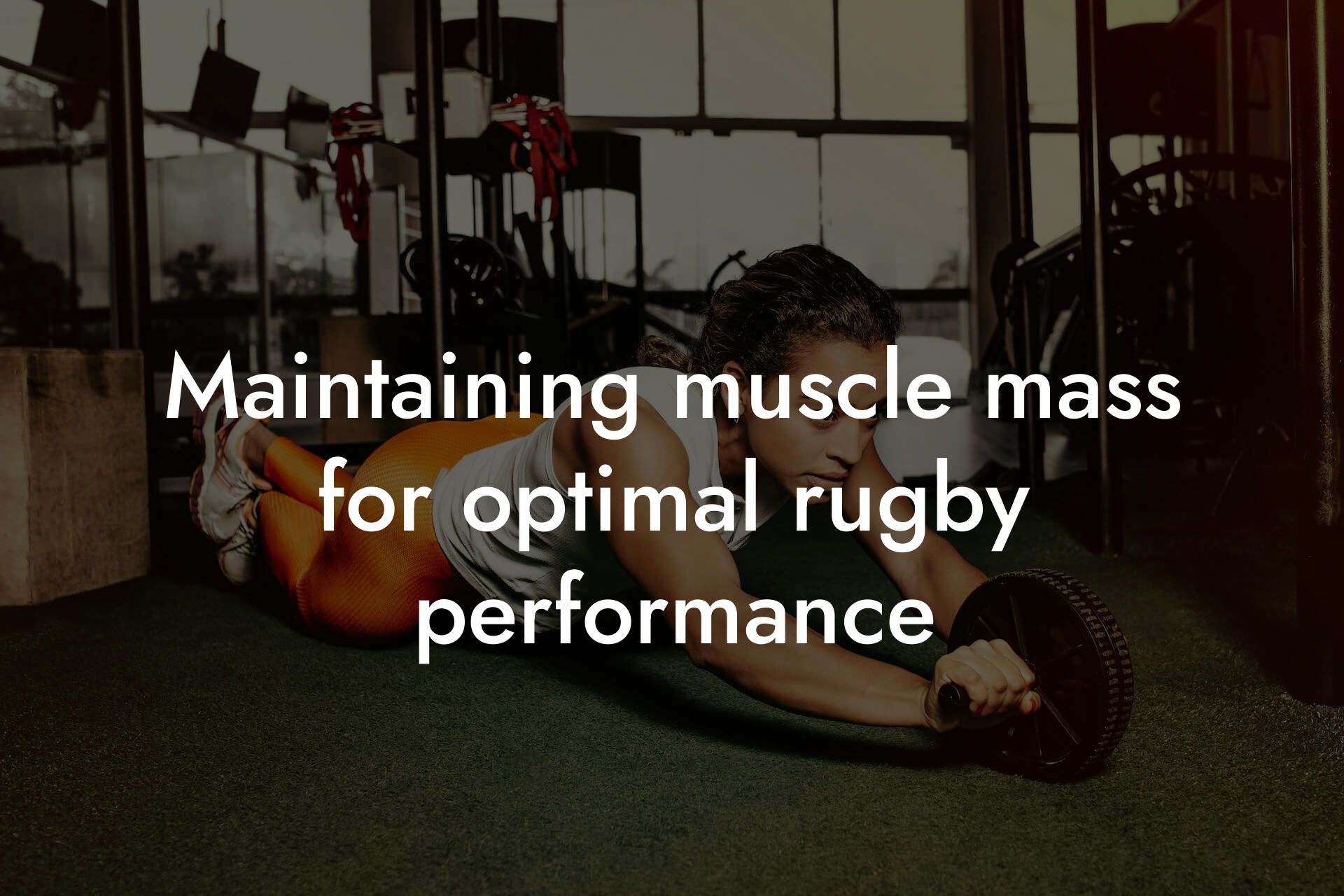Introduction to Bone Density and Rugby
Rugby is a high-impact, high-intensity sport that requires a combination of strength, power, speed, and agility. As a result, rugby players are at a higher risk of injuries, particularly those affecting the bones. Bone density plays a critical role in injury prevention, and understanding its importance can help rugby players take proactive steps to reduce their risk of injury and optimize their performance.
Table of Contents
What is Bone Density?
Bone density refers to the measure of how dense and strong an individual's bones are. It is an important indicator of bone health and can be affected by a range of factors, including genetics, diet, exercise, and hormones. In the context of rugby, bone density is crucial because it determines how well an individual's bones can withstand the physical demands of the sport.
Why is Bone Density Important in Rugby?
Bone density is essential in rugby because it helps to prevent injuries, particularly those affecting the spine, hips, and legs. Rugby players with low bone density are more susceptible to fractures, osteoporosis, and other bone-related injuries, which can be debilitating and even career-ending. Furthermore, low bone density can also impact a player's performance, as it can affect their power, speed, and agility.
Risk Factors for Low Bone Density in Rugby Players
Several factors can contribute to low bone density in rugby players, including:
- Genetics: Family history and genetic predisposition can play a role in bone density.
- Diet: A diet lacking in essential nutrients, such as calcium and vitamin D, can negatively impact bone density.
- Exercise: Inadequate exercise or a lack of weight-bearing activities can contribute to low bone density.
- Hormonal Imbalances: Hormonal imbalances, particularly those affecting testosterone and estrogen, can impact bone density.
- Age: Bone density naturally decreases with age, making older rugby players more susceptible to bone-related injuries.
How to Improve Bone Density in Rugby Players
Fortunately, bone density can be improved through a combination of diet, exercise, and lifestyle changes. Here are some strategies that rugby players can use to improve their bone density:
- Resistance Training: Engaging in resistance training exercises, such as weightlifting, can help to improve bone density.
- Weight-Bearing Activities: Participating in weight-bearing activities, such as running and jumping, can help to stimulate bone growth and density.
- Calcium and Vitamin D Supplementation: Ensuring adequate calcium and vitamin D intake through diet or supplementation can help to support bone health.
- Proper Nutrition: Consuming a balanced diet that is rich in essential nutrients, such as protein, vitamin K, and potassium, can help to support bone health.
DEXA Scanning for Bone Density Analysis
DEXA (Dual-Energy X-ray Absorptiometry) scanning is a non-invasive, pain-free test that measures bone density. It is an essential tool for rugby players, as it provides a detailed analysis of bone density and can help to identify areas of weakness. At Tano Performance Group, we use DEXA scanning as part of our comprehensive body assessment to provide rugby players with a detailed understanding of their bone density and overall health.
Injury Prevention Strategies in Rugby
In addition to improving bone density, there are several injury prevention strategies that rugby players can use to reduce their risk of injury:
- Warm-up and Cool-down: Engaging in proper warm-up and cool-down exercises can help to reduce the risk of injury.
- Strengthening Exercises: Engaging in strengthening exercises, such as those targeting the core and legs, can help to improve stability and reduce the risk of injury.
- Flexibility and Mobility: Maintaining good flexibility and mobility can help to reduce the risk of injury.
- Proper Tackling and Falling Techniques: Using proper tackling and falling techniques can help to reduce the risk of injury.
Bone density is a critical component of injury prevention in rugby. By understanding the importance of bone density, identifying risk factors, and implementing strategies to improve bone density, rugby players can reduce their risk of injury and optimize their performance. At Tano Performance Group, we are committed to providing rugby players with the tools and resources they need to achieve their goals and maintain optimal health.
Frequently Asked Questions
What is bone density and why is it important in rugby?
Bone density refers to the measure of how dense and strong your bones are. In rugby, having good bone density is crucial as it helps to reduce the risk of fractures and osteoporosis. Strong bones can withstand the physical demands of the sport, including tackles, falls, and collisions.
How does rugby affect bone density?
Rugby is a high-impact sport that can put a lot of stress on the bones, particularly in the spine, hips, and legs. Repeated tackles, falls, and collisions can cause micro-fractures in the bones, which can lead to a decrease in bone density over time. However, with proper training and nutrition, rugby players can also stimulate bone growth and increase density.
What are the risks of low bone density in rugby?
Low bone density in rugby players can increase the risk of fractures, osteoporosis, and other bone-related injuries. This can lead to prolonged periods of time out of the game, which can be detrimental to a player's career and overall well-being.
How can rugby players improve their bone density?
Rugby players can improve their bone density through a combination of proper nutrition, strength training, and plyometric exercises. A diet rich in calcium and vitamin D, along with regular exercise that includes weight-bearing activities, can help stimulate bone growth and increase density.
What role does nutrition play in bone density?
Nutrition plays a critical role in bone density. A diet that is rich in calcium, vitamin D, and other essential nutrients can help support bone health. Foods that are high in calcium, such as dairy products, leafy greens, and fortified cereals, can help promote bone growth and density.
What are some exercises that can help improve bone density in rugby players?
Exercises that are weight-bearing, such as squats, lunges, and deadlifts, can help stimulate bone growth and increase density. Plyometric exercises, such as jump squats and box jumps, can also be beneficial for improving bone density.
How often should rugby players engage in bone density exercises?
Rugby players should aim to engage in bone density exercises at least 2-3 times per week, with a minimum of 2-3 sets of 8-12 repetitions per exercise. Consistency is key when it comes to improving bone density.
What is the ideal age to start focusing on bone density in rugby?
It's never too early to start focusing on bone density in rugby. Even young players can benefit from exercises and nutrition that support bone health. However, it's particularly important for players in their 20s and 30s to prioritize bone density, as this is when bone mass peaks.
How can coaches and trainers support rugby players in improving their bone density?
Coaches and trainers can support rugby players in improving their bone density by incorporating bone density exercises into their training programs, providing education on proper nutrition, and encouraging players to prioritize bone health.
What are some common myths about bone density in rugby?
One common myth is that bone density is only a concern for older players. However, bone density is important for players of all ages. Another myth is that bone density is solely determined by genetics, when in fact, it can be improved through exercise and nutrition.
How does bone density impact overall health in rugby players?
Bone density has a significant impact on overall health in rugby players. Strong bones can reduce the risk of injuries, improve performance, and enhance overall well-being. Conversely, low bone density can lead to a range of health problems, including osteoporosis and fractures.
Can bone density be improved in older rugby players?
Yes, bone density can be improved in older rugby players. While bone mass peaks in the 20s and 30s, it's never too late to start taking steps to improve bone density. A combination of exercise, nutrition, and lifestyle changes can help older players improve their bone density.
How does bone density impact performance in rugby?
Bone density has a significant impact on performance in rugby. Strong bones can improve power, speed, and agility, while also reducing the risk of injuries. This can give players a competitive edge and enhance their overall performance.
What are some common injuries related to low bone density in rugby?
Common injuries related to low bone density in rugby include fractures, osteoporosis, and stress fractures. These injuries can be debilitating and require prolonged periods of time out of the game.
How can rugby players prevent injuries related to low bone density?
Rugby players can prevent injuries related to low bone density by prioritizing bone health through exercise, nutrition, and lifestyle changes. This includes engaging in regular strength training, eating a balanced diet, and getting enough sleep and rest.
What role does genetics play in bone density in rugby?
Genetics can play a role in bone density in rugby, but it's not the only factor. While some players may be more prone to low bone density due to genetic factors, exercise, nutrition, and lifestyle changes can still have a significant impact on bone density.
How can rugby players monitor their bone density?
Rugby players can monitor their bone density through regular bone density scans, such as dual-energy X-ray absorptiometry (DXA) scans. These scans can provide a detailed assessment of bone density and help players track changes over time.
What are some lifestyle changes that can help improve bone density in rugby players?
Lifestyle changes that can help improve bone density in rugby players include getting enough sleep and rest, reducing stress, and avoiding smoking and excessive alcohol consumption. These changes can help support bone health and improve overall well-being.
How does bone density impact long-term health in rugby players?
Bone density has a significant impact on long-term health in rugby players. Strong bones can reduce the risk of osteoporosis and fractures, while also improving overall health and well-being. Conversely, low bone density can lead to a range of long-term health problems.
What are some resources available to rugby players to learn more about bone density?
Rugby players can learn more about bone density through resources such as the Tano Performance Group website, which provides information on bone density, nutrition, and exercise. Additionally, players can consult with healthcare professionals, coaches, and trainers who specialize in bone health.
How can rugby players prioritize bone density in their busy schedules?
Rugby players can prioritize bone density in their busy schedules by incorporating bone density exercises into their training programs, making healthy nutrition choices, and finding ways to manage stress and get enough rest. Even small changes can make a big difference in bone health.
Here are some related articles you might love...
- Strength training programs for amateur rugby players
- Using DEXA scans to optimize rugby training
- Maintaining muscle mass for optimal rugby performance
- Nutrition strategies for sustaining energy during rugby matches
- How to optimize endurance and power in rugby
- The role of body composition in rugby performance
- Recovery strategies for rugby athletes after matches
- Reducing body fat for better agility and power in rugby
- Off-season conditioning for amateur rugby players
Zak Faulkner
Zak Faulkner is a leading authority in the realm of physical health and body composition analysis, with over 15 years of experience helping professionals optimise their fitness and well-being. As one the experts behind Tano Performance Group, Zak has dedicated his career to providing in-depth, science-backed insights that empower clients to elevate their physical performance and overall health.
With extensive knowledge of DEXA technology, Zak specializes in delivering comprehensive body assessments that offer precise data on body fat, muscle mass, bone density, and overall physique. His expertise enables individuals to make informed decisions and achieve their fitness goals with accuracy and confidence. Zak’s approach is rooted in a deep understanding of human physiology, combined with a passion for helping clients unlock their full potential through personalised strategies.
Over the years, Zak has earned a reputation for his commitment to excellence, precision, and client-focused service. His guidance is trusted by top professionals who demand the best when it comes to their health. Whether advising on fitness programs, nutritional strategies, or long-term wellness plans, Zak Faulkner’s insights are a valuable resource for anyone serious about taking their health and fitness to the next level.
At Tano Performance Group, Zak continues to lead our Content Team revolutionising how professionals approach their physical health, offering unparalleled expertise that drives real results.




